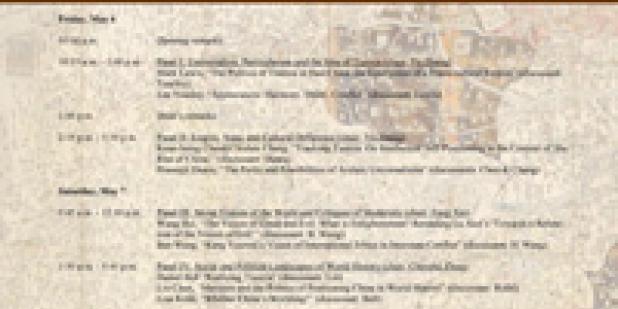Happy Lunar New Year from the USC US-China Institute!
Tianxia Workshop: Culture, International Relations, and World History: Rethinking Chinese Perceptions of World Order
A 5 day workshop will be held at Stanford University on China's perspective of Culture, International Relations, and World History.

The workshop will gather together a small group of distinguished scholars to engage in sustained conversations on the theoretical implications and practical values of the traditional Chinese vision of world order, or tianxia (all under heaven). This vision anchors a universal authority in the moral, ritualistic, and aesthetic framework of a secular high culture, while providing social and moral criteria for assessing fair, humanitarian governance and proper social relations. Varied discourses indebted to tianxia have resurfaced in modern China in quest of moral and cultural ways of relating to and articulating an international society. We believe that the Chinese vision may prove productive in exploring possibilities of world culture and literature in the tension-ridden yet interconnected world. In this workshop, we will examine the ways in which Chinese thinkers and writers have envisioned China’s place in and as world history and its new responsibility in the interstate world system.
Co-organizers: Ban Wang, Haiyan Lee, Yiqun Zhou
May 6, 2011
Panel I. Universalism, Particularism and the Idea of Tianxia
Mark Lewis & Mei-yu Hsieh, “The Politics of Tianxia in Han China: the Emergence of a Trans-cultural Empire”
Lee Yearley, “Appearances: Harmony, Order, Conflict”
Panel II. Empire, State, and Cultural Difference (chair: Yu Zhang)
Kuan-hsing Chen&Chishen Chang, “Tracking Tianxia: On Intellectual Self-Positioning in the Context of ‘the Rise of China’”
Prasenjit Duara, “The Perils and Possibilities of Archaic Universalisms”
May 7, 2011
Panel III. Moral Visions of the World and Critiques of Modernity (chair: Fang Xie)
Wang Hui, “The Voices of Good and Evil: What is Enlightenment? Rereading Lu Xun’s ‘Towards a Refutation of the Voices of Evil’”
Ban Wang, “Kang Youwei’s Vision of International Ethics in Interstate Conflict”
Panel IV. Social and Political Landscapes of World History (chair: Chenshu Zhou)
Daniel Bell “Realizing Tianxia”
Lin Chun, “Marxism and the Politics of Positioning China in World History”
Lisa Rofel, “Whither China’s Worlding?”
May 8, 2011
Panel V. Tradition as Resources for Revolution and Modernity
Yiqun Zhou, “The Meeting of Classical Minds: Greek Antiquity, Chinese Modernity, and the Changing World Order”
Viren Murthy, “’All Under Heaven’ and Postwar Japanese Sinologists Vision of Revolution: The Cases of Nishi Junzo and Mizoguchi Yuzo”
Panel VI. Hegemony, Soft Power, and Geopolitical Culture
Dai Jinhua, “In the Wake of the Post-Cold War: The Consciousness of “Chineseness” in a Changing World Pattern”
Haiyan Lee, “The Soft Power of the Constant Soldier; Or, Why We Should Stop Worrying and Learn to Love the PLA”
May 9, 2011
Daniel Bell, CEAS Brown Bag Talk: “The Revival of Confucianism in China.”
May 10, 2011
Kuan-hsing Chen, CEAS Colloquium Talk: “Takeuchi Yoshimi’s 1960 Lecture on ‘Asia as Method’”
May 11, 2011
Dai Jinhua, CEAS Colloquium Talk: "The Post-Post-Cold War Era:History, Memory, and Mass Culture" (in Chinese)
Featured Articles
We note the passing of many prominent individuals who played some role in U.S.-China affairs, whether in politics, economics or in helping people in one place understand the other.
Events
Ying Zhu looks at new developments for Chinese and global streaming services.
David Zweig examines China's talent recruitment efforts, particularly towards those scientists and engineers who left China for further study. U.S. universities, labs and companies have long brought in talent from China. Are such people still welcome?






